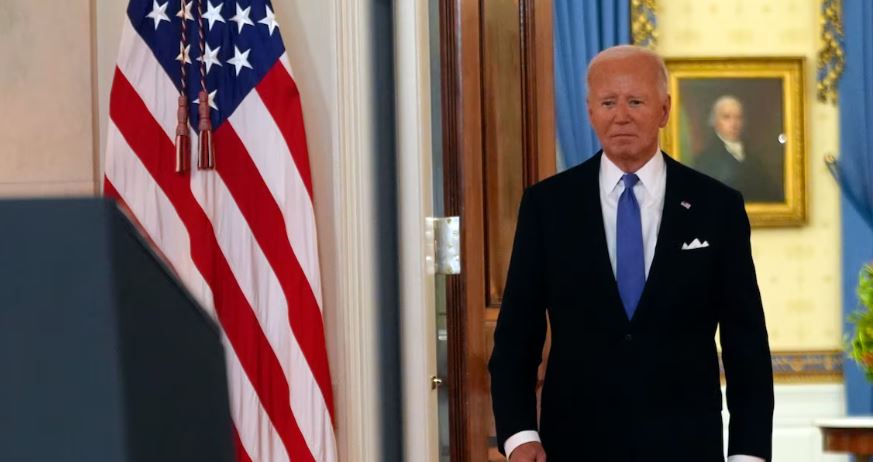Presidential Immunity Ruling Sparks Controversy
In a dramatic turn of events, President Joe Biden has vehemently criticized the U.S. Supreme Court’s recent ruling on presidential immunity, which is widely perceived as a triumph for his political adversary, former President Donald Trump. From the White House, Biden’s impassioned remarks underscored his deep-seated disapproval of the court’s decision, which he believes fundamentally alters the bedrock principle that no one in America is above the law.
The Supreme Court’s Landmark Decision
The Supreme Court’s landmark ruling, issued on Monday, decreed that former President Trump cannot be prosecuted for actions undertaken within the scope of his constitutional powers as president. However, the ruling left open the possibility of prosecution for private acts. This decision marks the first formal recognition of any form of presidential immunity from prosecution, thereby setting a significant precedent in American jurisprudence.
Biden’s Fierce Rebuttal
President Biden did not mince words in his rebuttal to the court’s decision. “This nation was founded on the principle that there are no kings in America,” Biden proclaimed. He emphasized that the Supreme Court’s ruling represents a seismic shift in this foundational principle, suggesting that it effectively places the president above the law.
Biden’s condemnation of the ruling is particularly poignant given his ongoing re-election campaign against Trump. The president has been a vocal critic of Trump’s actions related to the January 6, 2021, insurrection at the U.S. Capitol, where Trump’s supporters, galvanized by his spurious claims of a stolen 2020 election, attempted to disrupt the certification of Biden’s victory.
Implications of the Presidential Immunity Ruling
The Supreme Court’s ruling has ignited a fierce debate among legal scholars, politicians, and the general public. Critics argue that the decision could pave the way for future presidents to act with impunity, confident that their actions will be shielded from legal consequences if deemed to fall within the scope of their presidential duties.
Political Ramifications and Public Perception
The ruling comes at a critical juncture for Biden, who is grappling with calls for him to step aside as the Democratic Party’s nominee for the upcoming election. His recent performance in a debate against Trump, marred by a series of verbal missteps, has fueled speculation about his capacity to endure the rigors of another presidential campaign and a subsequent term in office.
Despite these challenges, Biden remains resolute in his determination to seek re-election, asserting that he is the most capable candidate to defeat Trump. The Supreme Court’s decision has only intensified the scrutiny on Biden, with his opponents using it as a cudgel to question his leadership and judicial acumen.
Broader Legal and Political Context
The Supreme Court’s ruling has far-reaching implications, not only for the current political landscape but also for the future of presidential accountability. Legal experts are divided on the potential consequences of the decision. Some contend that it provides necessary protections for the executive branch to function without the constant threat of legal action, while others warn that it erodes the foundational checks and balances designed to prevent abuse of power.
Nathan Sweeney, Chief Investment Officer of multi-asset at Marlborough, remarked, “The long-term implications of these trade tensions are particularly concerning for Germany, the EU’s primary exporting economy.” Mathieu Savary, Chief European Investment Strategist at BCA Research, echoed this sentiment, emphasizing the need for companies to acknowledge the heightened uncertainty.
The Role of Public Opinion
Public opinion on the Supreme Court’s ruling is deeply polarized, reflecting the broader political divide in the country. Supporters of Trump herald the decision as a vindication of his presidency and a rebuke of what they perceive as politically motivated attacks. Conversely, Biden’s supporters view the ruling as a dangerous precedent that could undermine the rule of law and democratic principles.
Conclusion
The Supreme Court’s ruling on presidential immunity has injected a new layer of complexity into the already contentious political landscape. As Biden continues to navigate the fallout from this decision, the broader implications for presidential accountability and the rule of law remain uncertain. This landmark ruling will undoubtedly be a focal point in the ongoing debate about the balance of power within the American political system.
Summary of Key Learning Points
| Key Learning Points |
|---|
| Supreme Court ruling grants limited presidential immunity. |
| Biden vehemently criticizes the decision as undermining the rule of law. |
| The ruling is perceived as a political victory for Trump. |
| Legal and political experts are divided on the implications. |
| Public opinion on the ruling is deeply polarized. |
| The decision has significant implications for future presidential accountability. |
| Biden faces increased scrutiny amid calls for him to step aside. |
Soumya Smruti Sahoo is a seasoned journalist with extensive experience in both international and Indian news writing. With a sharp analytical mind and a dedication to uncovering the truth, Soumya has built a reputation for delivering in-depth, well-researched articles that provide readers with a clear understanding of complex global and domestic issues. Her work reflects a deep commitment to journalistic integrity, making her a trusted source for accurate and insightful news coverage.



